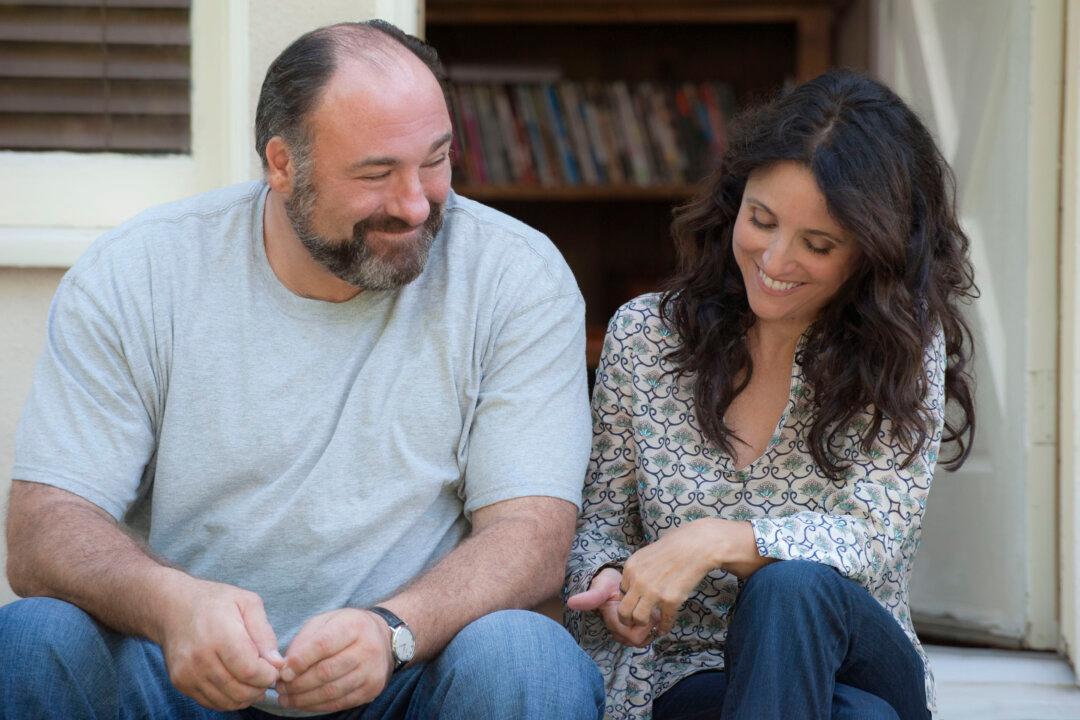Think you know Tony Soprano? Think you know Elaine from “Seinfeld”? Think again.
World-class New York acting coach Allen Savage (with whom this reviewer studied acting for 15 years) is fond of comparing acting to baseball. He uses the baseball term “power-alley” to describe the roles actors are closest to in real life—the ones they can perform falling off a log, without “stretching.”
The sweet, sad, mostly dull, Woody Allen-esque “Enough Said” shines in only one area, albeit unintentionally. It’s a nice teaching piece about the chameleon-like nature of actors, and what they can accomplish outside of the packaging and product of the money-making power-alley roles we come to most strongly identify them with.
Most of us think the late, great James Gandolfini was just like Tony Soprano in real life, and that Julia Louis-Dreyfus is exactly like her character Elaine on “Seinfeld.” Not so.
Eva (Louis-Dreyfus) is an incipient empty nester and a slightly granola-ish, Tevas and Lululemon-wearing masseuse.
She deals with clients who can’t shut up, have halitosis, or are clueless—in the latter case, a guy who simply stares at her while she lugs her heavy massage table up a long flight of stairs.
Her married friends (played by Toni Collette and Ben Falcone) drag her to a party where she meets Albert (Gandolfini). He’s a nice, roly-poly, hairy bear of a guy whose daughter is also about to leave for college.
Albert’s a television archivist. He’s funny. He says things like, “I tried watching that ‘Housewives of Idiot-town’ show.”
At this same party, Eva also meets Marianne, (Catherine Keener) a poetess in need of a massage therapist.
Thus, the party ends up killing the proverbial two birds. Suddenly Eva’s got a new client and a new boyfriend.
The party also begets an immediate and extremely obvious plot twist, but we'll abstain from spoiling.
Marianne, like the rest of Eva’s massage clients, does a repetitively annoying thing. She disparages her ex-husband constantly. Which is at first fine. And then not so much.
New boyfriend Albert also likes to disparage his ex-wife. “Her favorite place is The Container Store.”
He continues to be funny. In response to Eva’s telling him she knits, he confides that he weaves. On looms his keeps in his garage.
“Really?”
“Um, no. Now what on earth would make you think that I would weave?”
Eva and Marianne become fast friends.
As Eleanor Roosevelt once said, “Great minds discuss ideas; average minds discuss events; small minds discuss people.”
The people in this movie mostly do the latter, with a smattering of ideas here and there—which is sort of the inverse of an actual Woody Allen movie.
This is a brave performance by Julia Louis-Dreyfus. One definition of acting is “being private in public.” With Julia-as-Eva’s facial tics, caught-in-a-lie embarrassed stuttering, boundary-less and slightly stifling mothering, anguish at the empty nest, drudgery of seeing self-centered clients, and the stab in the heart of a bad breakup—Louis-Dreyfus leaves you thinking she simply must be just like this character, Eva, in real life.
Gandolfini redefined the Mafia-boss in “The Sopranos.” He was ruthless, slit-eyed, mean, and yet human.
The opening credit-roll sequence for “The Sopranos”—with the cigar-holding, pinky-ringed hand doing the hulking gangster-lean in the maroon Suburban, the toxic Jersey landscape drifting by, and the sly, sinister lyrics “born under a bad sign”—this is how we'll always remember him.
Would that we had gotten to see more of his warmth and humor in Albert-type roles.
Although totally dissimilar physically, he and Julia Louis-Dreyfus have delightful middle-age chemistry, which brings to mind an Allen Savage nugget of acting-craft wisdom: Even if you’re not attracted to the person, find one thing about that person you can love, and work with that. You can always find one thing.
All the rest of the movie is pretty much piecrust. It helps, certainly, but you don’t normally eat crust on its own. More likely, you'll eat apples on their own. Julia and James are the apples.
“Enough Said” demonstrates two world-class actors entirely divesting themselves of their power-alley roles and becoming altogether new people. These people seem even closer to who the actors might really be in real life.
It’s slightly magical. It’s also just the art and craft of good acting.
Julia Louis-Dreyfus, wonderful actress. James Gandolfini, wonderful actor. R.I.P. James. Enough Said.





